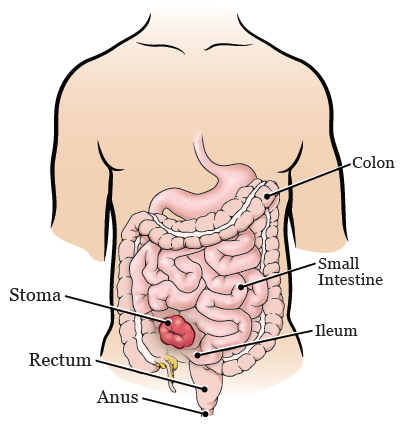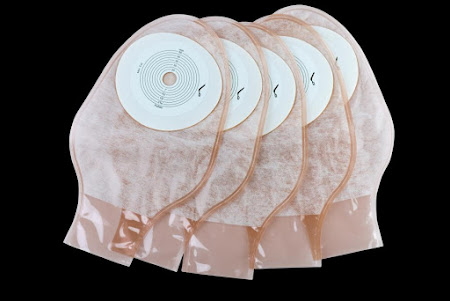The digestion starts from the mouth, where the food is broken into pieces as we chew it. Saliva makes it easy to swallow those broken pieces of food. Food then travels to the stomach through the esophagus. It is further broken down by enzymes. This semi-liquid food mixture then travels to the small intestine, where the absorption of nutrients into the bloodstream starts taking place.
The absorption of nutrients continues to take place as the food mixture travels along the intestinal tract. However, not all of the mixture gets absorbed. The leftover wastes travel along the large intestine, which absorbs moisture from those waste materials. Those wastes accumulate in the rectum. When the rectum is full, we feel the need to move bowels. During the bowel movement, the sphincter muscles of the anus relax and allow waste materials to pass out of the body.
Ileostomy, which involves the removal of the entire colon
An ileostomy involves the removal of the entire colon and then bringing out of a part of the small intestine out through the abdominal wall. The edge of the small intestine is then stitched to the abdominal skin. This way, the GI tract opens through a cut in the belly, allowing waste materials to pass out from there. It can be a loop ileostomy or an end ileostomy.
In most cases, the surgeon opts to create an ileostomy to allow the lower GI tract to recover from an injury or disease. When that part of the tract is healthy again, the surgeon performs another surgery to reverse the stoma, allowing the patient to pass out stools from the anus.
Colostomy, which involves the removal of a part of the colon
A colostomy is a surgically created opening in the abdomen that allows the patient to retain some part of the colon after the operation. It means that the stoma sticking out on the belly, in this case, is a part of the large bowel. This stoma can be an end colostomy, a loop colostomy, or a double-barrel colostomy. The placement of the stoma will depend on the part of the colon cut and diverted away from the remaining GI tract.
A colostomy, like an ileostomy, can be temporary or permanent, depending on the type and severity of the underlying health condition.
A stoma
As mentioned above, the stoma is a part of the bowel sticking out on the belly. The purpose of creating this opening is to allow fecal materials to leave the body without passing through the diseased part of the GI tract. A stoma is red and moist. It doesn’t have any nerve endings, which means that it doesn’t hurt when you rub on it. It may, however, bleed easily due to the presence of a lot of blood vessels. Minor bleeding should stop in a few minutes. You may, however, need to consult an ostomy care nurse if the bleeding seems persistent.
There are a lot of things to consider when it comes to stoma care. The skin around the stoma, also called peristomal skin, holds a key value in this regard because this part of the skin is responsible for providing the ostomy pouch to the ground to stick on. You can speak to your ostomy care nurse regarding what to do to take care of your stoma and the skin around it.











